 Recently, a discussion in comments over at The Film Experience inspired something of a revelation. StinkyLulu just doesn't love Martin Scorsese movies. (Lulu's not too worried - Marty's gotta lotta love out there.) Sure, Lu adores the man's passion for film history and, yes, StinkyLulu absolutely admires a number of his films (Taxi Driver, Last Temptation... & Goodfellas especially). But no, as a rule, StinkyLulu does not love Martin Scorsese movies. Even hates one or two. Yet, there's an exception that proves this "Lulu Does Not Love Marty" rule: an atypically small & quirky 1985 comedy that StinkyLulu has loved and loved deeply. (For a time, this little flick was even on Lu's top ten all-time favorite movies list.) And it might come as little surprise to you, lovely reader, that the main reason for all that exception-provin'-the-rule luvin', of course, is...
Recently, a discussion in comments over at The Film Experience inspired something of a revelation. StinkyLulu just doesn't love Martin Scorsese movies. (Lulu's not too worried - Marty's gotta lotta love out there.) Sure, Lu adores the man's passion for film history and, yes, StinkyLulu absolutely admires a number of his films (Taxi Driver, Last Temptation... & Goodfellas especially). But no, as a rule, StinkyLulu does not love Martin Scorsese movies. Even hates one or two. Yet, there's an exception that proves this "Lulu Does Not Love Marty" rule: an atypically small & quirky 1985 comedy that StinkyLulu has loved and loved deeply. (For a time, this little flick was even on Lu's top ten all-time favorite movies list.) And it might come as little surprise to you, lovely reader, that the main reason for all that exception-provin'-the-rule luvin', of course, is...

...The Women of After Hours (1985)
Rosanna Arquette, Linda Fiorentino, Teri Garr, Catherine O'Hara & Verna Bloom
no stats for this one
After Hours follows Paul Hackett (Griffin Dunne), a cubicle dwelling office wonk, as he dips his toes in the wild waters of mid80s Soho and gets caught in the vortex of a crazy NY night. In the six or seven hours that follow his encounter with a dazed and confused beauty (Rosanna Arquette), Paul gets a call, loses all his money, makes art, gets lost, stumbles into an SM sex scene, gets implicated as the cause of a beautiful woman's suicide, inspires the ire of the transit authority, gets stalked, gets shoved around in a mosh pit, gets a partial haircut, gets accused of being a serial burglar, gets cruised in a park, gets chased by a vigilante mob led by a Mr.Frosty truck, gets encased in paper mache, gets stolen, and finally gets dropped off right in front of his office in time for work the next morning. It's a long NY night.
After Hours follows the basic narrative structure of a classical epic (ie. the "hero" must accomplish a set of insurmountable tasks before order can be restored...or, as here, "get out of Soho alive"). Dunne's Paul is hardly heroic, however. He's completely self-absorbed. He's trapped in a desperately sterile loneliness. He's also horny. In a way, Scorsese's film offers him as an everyman for the 1980s: an unremarkable straight white guy who's groping, clutching and staggering in search of intimacy amidst an urban social landscape both beyond his comprehension and his comfort zone. And the women of After Hours chart the contours of that landscape -- beginning with Rosanna Arquette.
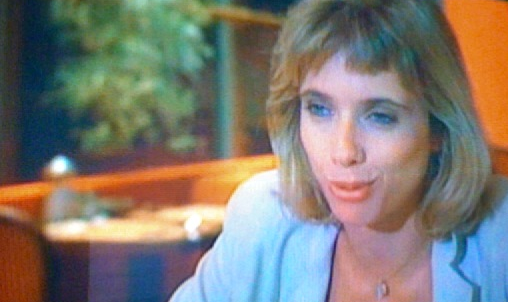 Arquette's Marcy is Paul's siren, the beautiful woman who gives him her number and inspires him to do something a little crazy by heading out after 11pm on a worknight. Arquette's performance is at once anchored and arbitrary, her random tourette's-ish outbursts cohering in a vague (vaguely stoned?) persona that's both confident woman and wounded girl. (And thus as catnip for emotionally stunted straight guys everywhere.) Arquette's scenes start sweet & sexy before becoming incrementally strange. By the time Dunne's Paul starts to "dump" Marcy, it seems a good idea. Of course, to either approach or flee Arquette's Marcy, Paul must negotiate with Linda Fiorentino.
Arquette's Marcy is Paul's siren, the beautiful woman who gives him her number and inspires him to do something a little crazy by heading out after 11pm on a worknight. Arquette's performance is at once anchored and arbitrary, her random tourette's-ish outbursts cohering in a vague (vaguely stoned?) persona that's both confident woman and wounded girl. (And thus as catnip for emotionally stunted straight guys everywhere.) Arquette's scenes start sweet & sexy before becoming incrementally strange. By the time Dunne's Paul starts to "dump" Marcy, it seems a good idea. Of course, to either approach or flee Arquette's Marcy, Paul must negotiate with Linda Fiorentino.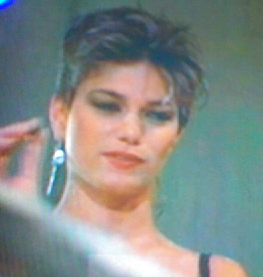 Fiorentino's Kiki stirs Paul's loins in ways that scare him. And, delightfully, Fiorentino keeps her pitch playfully abstract -- a well-fed cat toying with a panicked mouse. At first glance, she's all danger -- nudity, casual intimacy, sex games, sex toys, eyelined leatherman boyfriend Horst -- but that also means there's no surprises with Kiki. Anything can happen and everything's cool. Fiorentino's clarity in the role helps make Kiki one of the most memorable and "safest" presences in the film, unlike Catherine O'Hara and Teri Garr.
Fiorentino's Kiki stirs Paul's loins in ways that scare him. And, delightfully, Fiorentino keeps her pitch playfully abstract -- a well-fed cat toying with a panicked mouse. At first glance, she's all danger -- nudity, casual intimacy, sex games, sex toys, eyelined leatherman boyfriend Horst -- but that also means there's no surprises with Kiki. Anything can happen and everything's cool. Fiorentino's clarity in the role helps make Kiki one of the most memorable and "safest" presences in the film, unlike Catherine O'Hara and Teri Garr.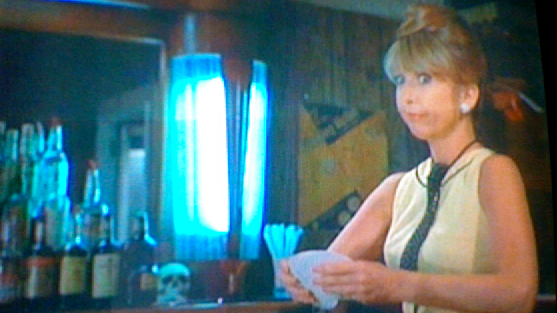 Teri Garr plays Julie and Catherine O'Hara plays Gail. Regular gals with regular names. (Played by adept comic actresses with unusally humane depths.)
Teri Garr plays Julie and Catherine O'Hara plays Gail. Regular gals with regular names. (Played by adept comic actresses with unusally humane depths.) 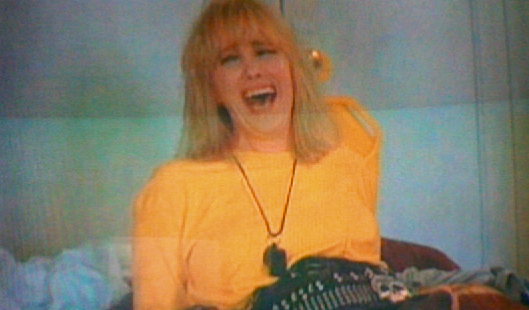 Julie and Gail both wear bright yellow & black outfits. Their ensembles glare like police caution tape -- a none-too-subtle warning which Dunne's Paul does not heed. Paul first meets Garr's Julie, a the sweet girl seeking the rescue of a good man.
Julie and Gail both wear bright yellow & black outfits. Their ensembles glare like police caution tape -- a none-too-subtle warning which Dunne's Paul does not heed. Paul first meets Garr's Julie, a the sweet girl seeking the rescue of a good man. 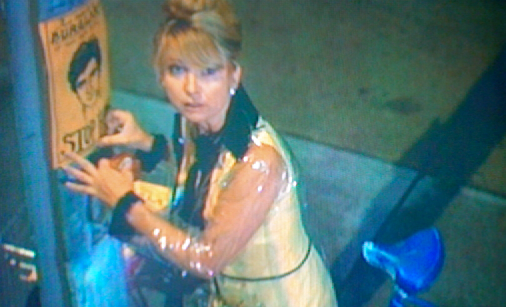 Later, he meets O'Hara's Gail, the take charge woman who's happy to take care of herself and her fella. Both women are initially interested in Paul. But, of course, Paul inevitably disappoints them both. Fatally. Garr's Julie lapses into a pit of neurotic need which turns vengeful once Paul flees.
Later, he meets O'Hara's Gail, the take charge woman who's happy to take care of herself and her fella. Both women are initially interested in Paul. But, of course, Paul inevitably disappoints them both. Fatally. Garr's Julie lapses into a pit of neurotic need which turns vengeful once Paul flees. 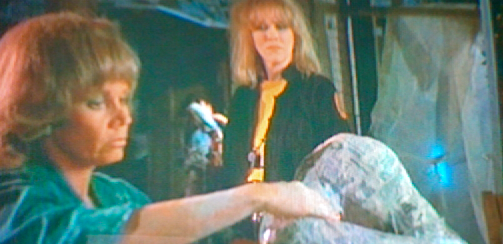 O'Hara's Gail seems a woman on the verge of becoming completely unhinged. She bosses and bullies Paul well enough, but when it's "revealed" that Paul's the Soho burglar? Well, O'Hara's Gail goes on a tear in her MrSofty truck to rid the streets of Soho of such dangers as Paul. Perhaps permanently...
O'Hara's Gail seems a woman on the verge of becoming completely unhinged. She bosses and bullies Paul well enough, but when it's "revealed" that Paul's the Soho burglar? Well, O'Hara's Gail goes on a tear in her MrSofty truck to rid the streets of Soho of such dangers as Paul. Perhaps permanently...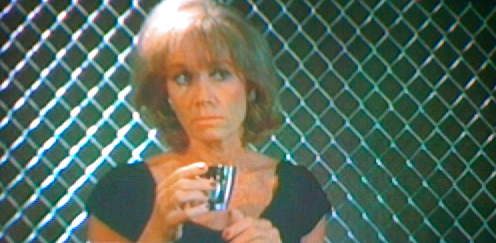 All of which drives Dunne's Paul into the welcoming arms of Verna Bloom's June. Like each of the women before her, Bloom (a Scorsese regular) seems to Dunne's Paul an ideal refuge, indulging Paul's clumsy flirtations with generosity and gratitude. Bloom's performance is perhaps the most enigmatic -- and effective -- in the film. At first she seems almost somnambulent, before she takes aggressive charge rescuing Paul from the vigilante horde. Or...has she in fact trapped Paul?
All of which drives Dunne's Paul into the welcoming arms of Verna Bloom's June. Like each of the women before her, Bloom (a Scorsese regular) seems to Dunne's Paul an ideal refuge, indulging Paul's clumsy flirtations with generosity and gratitude. Bloom's performance is perhaps the most enigmatic -- and effective -- in the film. At first she seems almost somnambulent, before she takes aggressive charge rescuing Paul from the vigilante horde. Or...has she in fact trapped Paul?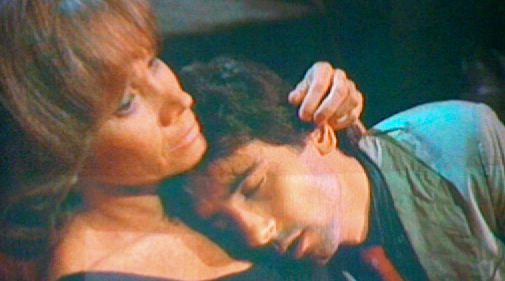
The nightmarish dreaminess of After Hours operates on this sharp-edged pivot of gendered intimacy. Are the women he encounters Paul's salvation? Or his doom? Paul's like the ball in a pinball machine, hurtling about in a world over which he has no control. And it's to the credit of the actressing at the edges of After Hours that this fairy tale of masculine erotic anxiety does not lapse too easily into banal misogyny. Arquette, Fiorentino, Garr, O'Hara and Bloom contribute memorable and joyful performances to this dark little thriller of a comedy, making After Hours an almost actress-driven piece...and thus all the more idiosyncratic a Scorsese picture, the exception to StinkyLulu's rules of Martin Scorsese.
An aside: Additionally, consider what has to be the most (if not only?) sustained queer content ever in a Scorsese film. At each point along the journey, Dunne's Paul has a series of evocative encounters with homos, the masculine intimacies offered almost as alternatives to the terrifying women. These men -- sometimes incredibly gay, sometimes incredibly tough -- inhabit the landscape of the film in a curiously ominous...obliquely dangerous way. Indeed, despite the film's extraordinary innocence of social significance, StinkyLulu was startled to see how easily this film can be read as a straight male reaction to the early AIDS era. The gays are kind in After Hours, but they signal the uncharted dangers of Paul's single-minded erotic pursuit. All of which, unexpectedly, leads StinkyLulu to ask: is After Hours Marty's AIDS movie?

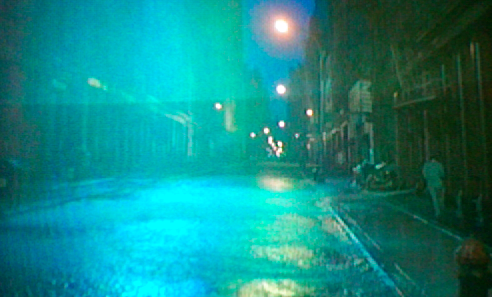
5 comments:
I haven't seen After Hours (though, as usual, reading you talking about a movie always makes me want to see the film immediately), but I read a lot of homo-subtext in The Departed - Scorsese pretty definitively points to Matt Damon's character having some buried issues that lead to trouble in his marriage and her subsequent cheating on him with DiCaprio.
I totally missed that in The Departed. (But that might just be what happens when one 'watches' a movie while sheilding one's eyes from the gory spectacle of Jack. And, even then, I tend to read everything that Matt Damon does as having "some buried issues"...) That said, I believe you.
I'm just always amazed -- in the NYcentric filmographies of dudes like Scorsese and Woody Allen -- at the absolute paucity of expressedly homo characters. (And, to be clear, I don't look for "affirmative" portrayals..)
Thank you, thank you, thank you for highlighting this movie, Lu. It's probably my favorite movie of its year and I recommend it to folks all the time.
All of the women are excellent, especially Garr and O'Hara who (upon reflection) do exactly what you'd expect of them, but still surprise and thrill. Also, I lived in New York for many years and the Soho here is a Soho that is pretty much gone for good now. I'll never get enough of this one.
By the way, on the DVD that I have, there are deleted scenes of Catherine O'Hara that are just fantastic. Too bad they were cut from the final product.
Love you!
Misty - For another excellent glimpse of a Soho now gone, MrStinky & I just screened The Eyes of Laura Mars...amazing.
And 'twas you Misty who flagged O'Hara's deleted scenes for me. Thanks so much for that. The scene on the staircase is really the missing link in her performance. She's really good... I love her.
I'm so glad to find another After Hours freak...
Thank you, Lu. I have just put "Laura Mars" at the top of my Netflix queue. Unfortunately, "Cruising" is not yet on DVD.
Too bad, because I saw them both when first released but am ready for a second look. They would have made a great little NYC thriller double feature! I decided to make it a "Faye double" instead and finally watch the original "Thomas Crown Affair".
Enjoy your weekend!
Post a Comment